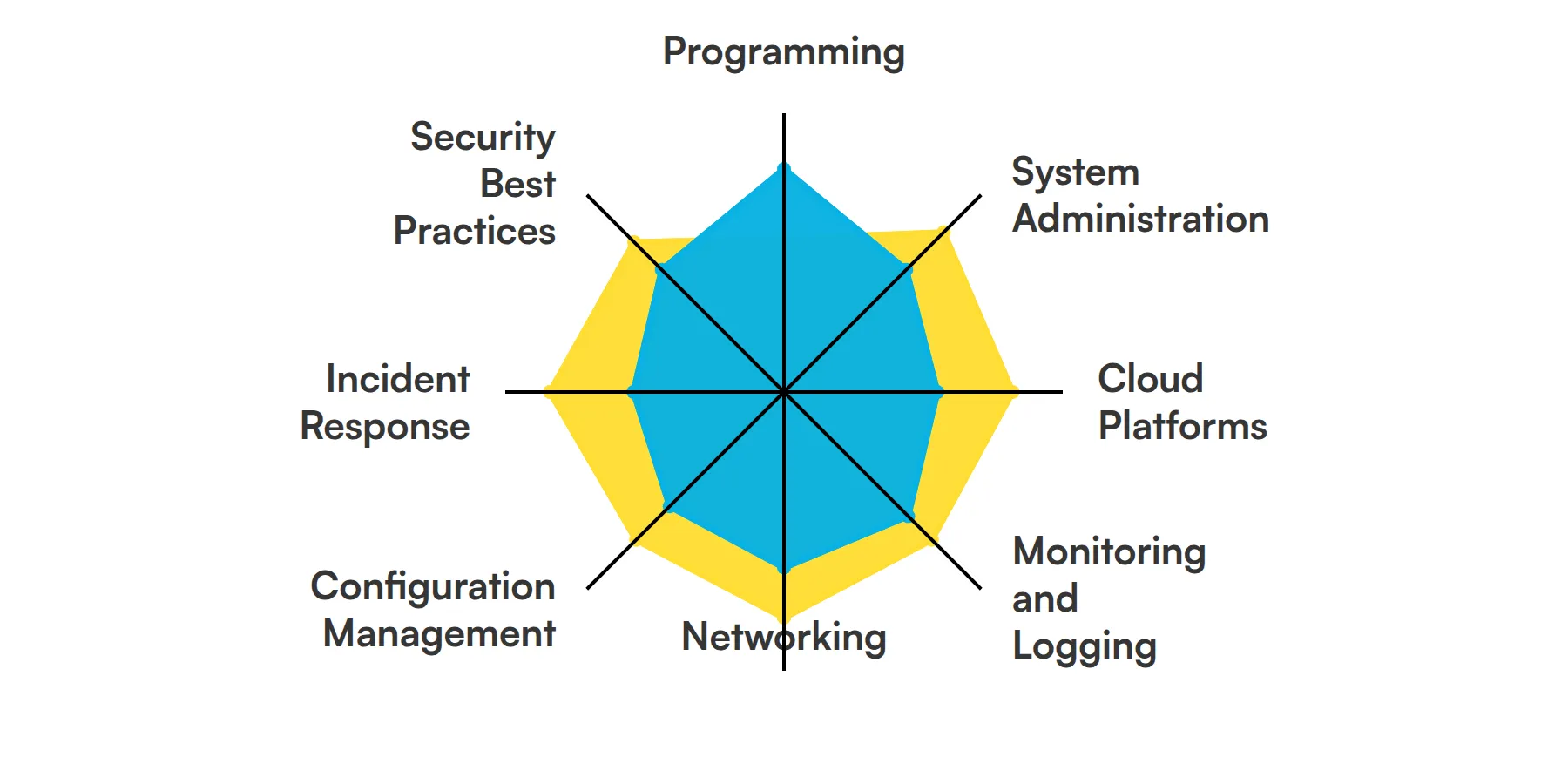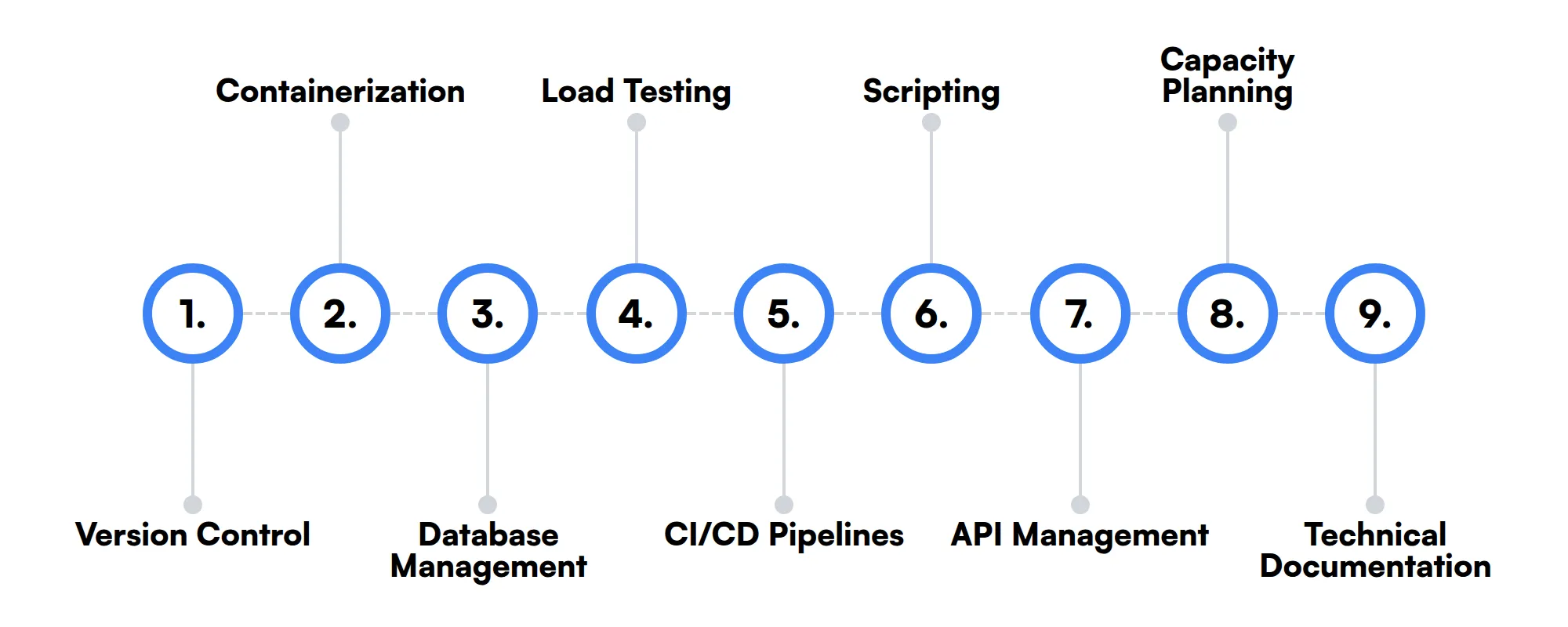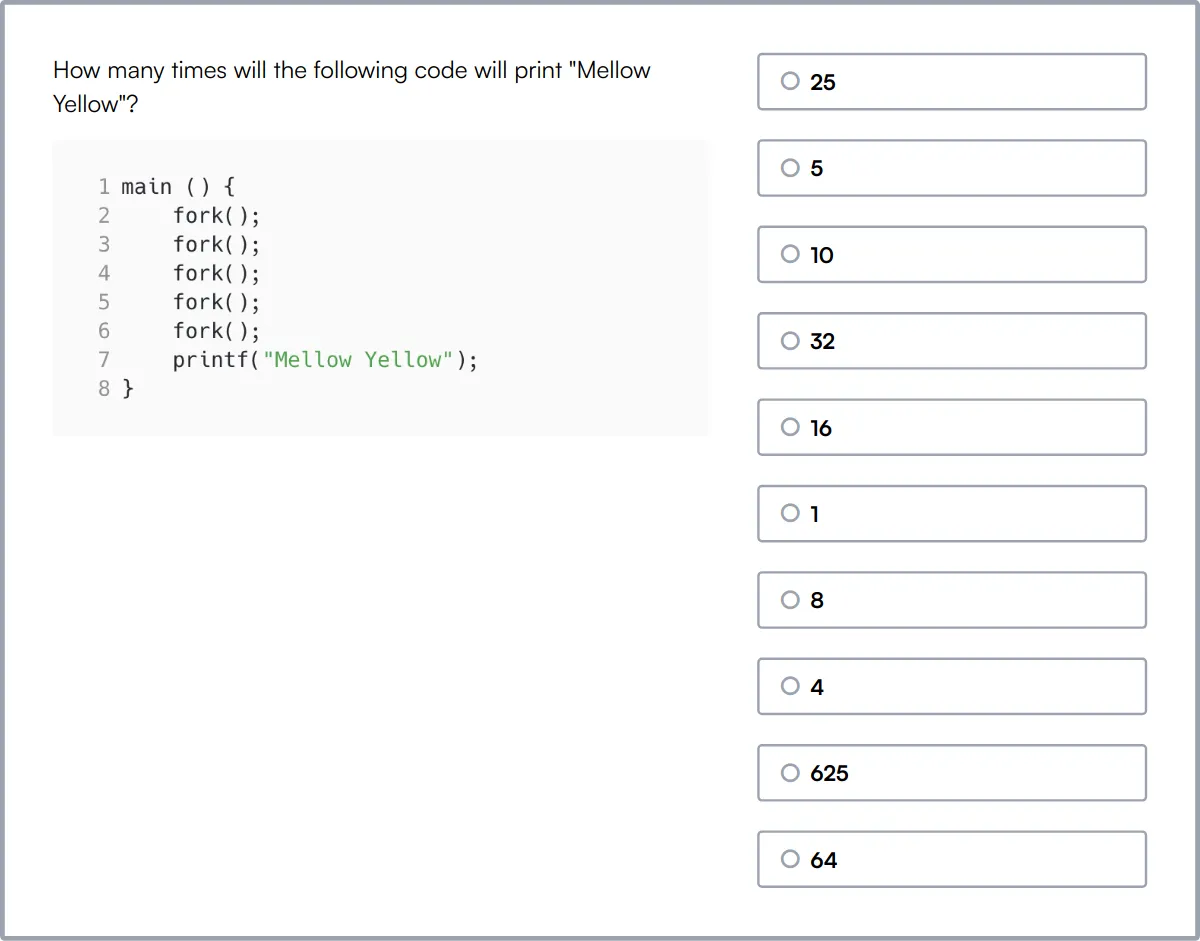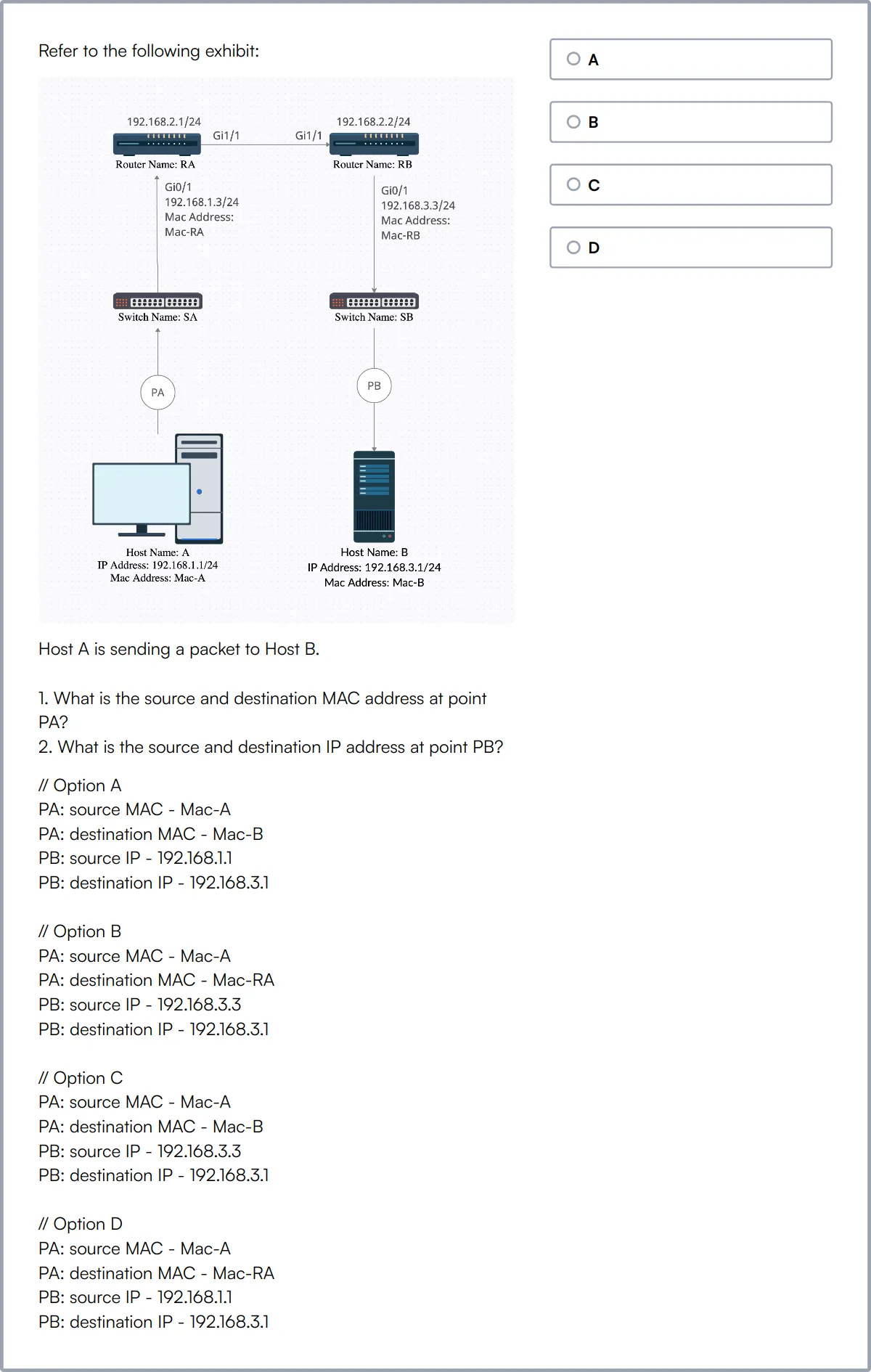Site Reliability Engineers (SREs) are the backbone of reliable and scalable systems. They ensure that services are up and running smoothly, balancing the demands of development and operations to maintain high availability and performance.
SRE skills encompass a mix of software engineering and systems administration, including proficiency in automation, monitoring, and incident response, as well as strong analytical and communication abilities.
Candidates can write these abilities in their resumes, but you can’t verify them without on-the-job Site Reliability Engineer skill tests.
In this post, we will explore 8 essential Site Reliability Engineer skills, 9 secondary skills and how to assess them so you can make informed hiring decisions.
Table of contents
8 fundamental Site Reliability Engineer skills and traits
The best skills for Site Reliability Engineers include Programming, System Administration, Cloud Platforms, Monitoring and Logging, Networking, Configuration Management, Incident Response and Security Best Practices.
Let’s dive into the details by examining the 8 essential skills of a Site Reliability Engineer.

Programming
Programming is at the heart of a Site Reliability Engineer's role. You'll need to write scripts and develop tools to automate tasks, manage infrastructure, and improve system reliability. Proficiency in languages like Python, Go, or Java can be particularly useful.
For more insights, check out our guide to writing a Programmer Job Description.
System Administration
A strong understanding of system administration is crucial for managing and maintaining servers and networks. You'll be responsible for configuring, monitoring, and troubleshooting systems to ensure they run smoothly and efficiently.
Cloud Platforms
Familiarity with cloud platforms such as AWS, Google Cloud, or Azure is essential. Site Reliability Engineers often deploy and manage applications in the cloud, leveraging its scalability and flexibility to optimize performance and cost.
Check out our guide for a comprehensive list of interview questions.
Monitoring and Logging
Monitoring and logging are key to understanding system performance and identifying issues. You'll use tools like Prometheus, Grafana, or ELK Stack to track metrics, set up alerts, and analyze logs to maintain system health.
Networking
Networking knowledge is important for configuring and managing network infrastructure. You'll need to understand protocols, firewalls, and load balancers to ensure secure and efficient data flow across systems.
For more insights, check out our guide to writing a Network Engineer Job Description.
Configuration Management
Configuration management tools like Ansible, Puppet, or Chef help automate the deployment and management of systems. As a Site Reliability Engineer, you'll use these tools to ensure consistency and reduce manual errors.
Incident Response
Being prepared for incidents is a critical part of the job. You'll develop and follow incident response plans to quickly address and resolve system outages or performance issues, minimizing downtime and impact on users.
Check out our guide for a comprehensive list of interview questions.
Security Best Practices
Understanding security best practices is essential to protect systems from vulnerabilities and attacks. You'll implement security measures, conduct audits, and ensure compliance with industry standards to safeguard data and infrastructure.
9 secondary Site Reliability Engineer skills and traits
The best skills for Site Reliability Engineers include Version Control, Containerization, Database Management, Load Testing, CI/CD Pipelines, Scripting, API Management, Capacity Planning and Technical Documentation.
Let’s dive into the details by examining the 9 secondary skills of a Site Reliability Engineer.

Version Control
Knowledge of version control systems like Git is important for managing code changes and collaborating with development teams. It helps track changes, resolve conflicts, and maintain a history of code evolution.
Containerization
Experience with containerization technologies like Docker and Kubernetes can be beneficial. These tools help package applications and manage them in isolated environments, improving deployment consistency and scalability.
Database Management
Understanding database management is useful for optimizing data storage and retrieval. You'll work with databases like MySQL, PostgreSQL, or NoSQL solutions to ensure data integrity and performance.
Load Testing
Load testing skills help assess system performance under stress. You'll use tools like JMeter or LoadRunner to simulate traffic and identify bottlenecks, ensuring systems can handle peak loads.
CI/CD Pipelines
Familiarity with Continuous Integration and Continuous Deployment (CI/CD) pipelines is valuable for automating software delivery. You'll set up and maintain pipelines to streamline code integration and deployment processes.
Scripting
Scripting skills in languages like Bash or PowerShell are useful for automating routine tasks and managing system configurations. They help reduce manual effort and improve operational efficiency.
API Management
Understanding API management is important for integrating and managing services. You'll work with APIs to connect systems, automate workflows, and enhance functionality across platforms.
Capacity Planning
Capacity planning involves predicting future resource needs to ensure systems can scale effectively. You'll analyze usage patterns and plan for growth to prevent resource shortages and maintain performance.
Technical Documentation
Creating and maintaining technical documentation is important for knowledge sharing and onboarding. You'll document processes, configurations, and incident responses to ensure consistency and facilitate team collaboration.
How to assess Site Reliability Engineer skills and traits
Assessing the skills and traits of a Site Reliability Engineer (SRE) requires a comprehensive approach, as these professionals are tasked with maintaining the reliability and performance of complex systems. It's not just about knowing the right technologies; it's about understanding how to apply them effectively in real-world scenarios. From programming and system administration to cloud platforms and incident response, SREs need a diverse skill set to ensure systems run smoothly and efficiently.
Traditional resumes and interviews often fall short in evaluating the practical skills of an SRE. This is where skills-based assessments come into play. By focusing on real-world scenarios and problem-solving abilities, these assessments provide a clearer picture of a candidate's capabilities. Adaface on-the-job skill tests are designed to help you identify the right talent, offering a 2x improved quality of hires and an 85% reduction in screening time. These assessments cover key areas such as monitoring and logging, networking, and security best practices, ensuring you find the best fit for your team.
Let’s look at how to assess Site Reliability Engineer skills with these 6 talent assessments.
Basic Computer Skills Test
Our Basic Computer Skills Test evaluates a candidate's knowledge of fundamental computer skills, including data entry, Linux, Excel, computer programming aptitude, shell scripting, typing, system administration, and data analysis.
The test assesses their understanding of basic computer operations, data entry, and system administration. It also evaluates their ability to work with Excel and perform shell scripting.
Successful candidates demonstrate proficiency in using computer systems, managing data, and performing administrative tasks.
Windows System Administration Online Test
Our Windows System Administration Online Test uses scenario-based MCQs to evaluate candidates on their understanding of core Windows system administration concepts such as Active Directory, group policy management, network services, and system monitoring.
The test challenges candidates on Windows Server management, Active Directory, and network security. It also assesses their knowledge of PowerShell scripting and server virtualization.
Candidates who perform well show a strong grasp of managing Windows-based enterprise environments and securing network infrastructures.
Cloud Computing Online Test
Our Cloud Computing Online Test evaluates a candidate's knowledge and understanding of various aspects of cloud computing, including service models, deployment models, and virtualization.
The test assesses proficiency in cloud service models, cloud security, and scalability. It also evaluates their understanding of cloud storage and networking.
High-scoring candidates demonstrate a strong understanding of cloud orchestration and automation, as well as the ability to manage cloud-based infrastructures.

Elasticsearch Test
Our Elasticsearch Test uses scenario-based MCQs to evaluate candidates' ability to design and deploy Elasticsearch clusters, configure and optimize search queries, and manage data ingestion and indexing.
The test assesses skills in data indexing, search queries, and cluster management. It also evaluates their ability to perform performance optimization and monitoring.
Candidates who excel in this test show proficiency in integrating Elasticsearch with other systems and managing its security and scaling.
Network Engineer Online Test
Our Network Engineer Test uses scenario-based multiple choice questions to evaluate candidates on their technical knowledge and practical skills related to computer networking.
The test covers network protocols, routing and switching, and network security. It also assesses their ability to perform network troubleshooting and design.
Successful candidates demonstrate a strong understanding of network performance optimization and the ability to manage complex network infrastructures.

Puppet & Chef Online Test
Our Puppet & Chef Online Test uses scenario-based MCQs to evaluate candidates' proficiency in deploying, configuring, and maintaining infrastructure using Puppet and Chef.
The test assesses skills in node configuration, recipe management, and security. It also evaluates their ability to use Knife plugins and manage Chef server.
Candidates who perform well show a strong understanding of automating system tasks and managing configuration files effectively.
Summary: The 8 key Site Reliability Engineer skills and how to test for them
| Site Reliability Engineer skill | How to assess them |
|---|---|
| 1. Programming | Evaluate candidate's ability to write, analyze and debug code. |
| 2. System Administration | Assess management of servers, devices, and software operations skills. |
| 3. Cloud Platforms | Check proficiency in managing and deploying applications on cloud services. |
| 4. Monitoring and Logging | Determine ability to implement and maintain system monitoring protocols. |
| 5. Networking | Review knowledge of network architecture and troubleshooting techniques. |
| 6. Configuration Management | Test skills in managing software and hardware configurations. |
| 7. Incident Response | Judge capability to handle and resolve IT emergencies. |
| 8. Security Best Practices | Evaluate understanding and application of IT security protocols. |
Site Reliability Test
Site Reliability Engineer skills FAQs
What programming languages are most relevant for a Site Reliability Engineer?
Site Reliability Engineers often use languages like Python, Go, and Java. These languages help automate tasks, manage infrastructure, and develop tools.
How can recruiters assess a candidate's system administration skills?
Assess system administration skills by asking candidates about their experience with Linux/Unix systems, shell scripting, and managing server configurations.
What should recruiters look for in a candidate's cloud platform experience?
Look for experience with AWS, Google Cloud, or Azure. Candidates should understand cloud services, deployment, and cost management.
How do you evaluate a candidate's ability in monitoring and logging?
Ask about their experience with tools like Prometheus, Grafana, or ELK stack. They should know how to set up alerts and analyze logs.
What networking skills are important for a Site Reliability Engineer?
Candidates should understand TCP/IP, DNS, load balancing, and network security. Experience with tools like Wireshark can be beneficial.
How can you assess a candidate's incident response skills?
Discuss past incidents they've handled, focusing on their role, the resolution process, and how they improved systems to prevent future issues.
What is the role of containerization in site reliability engineering?
Containerization, using tools like Docker and Kubernetes, helps in deploying applications consistently across environments and managing microservices.
Why is version control important for Site Reliability Engineers?
Version control, using systems like Git, allows engineers to track changes, collaborate on code, and roll back to previous states if needed.

40 min skill tests.
No trick questions.
Accurate shortlisting.
We make it easy for you to find the best candidates in your pipeline with a 40 min skills test.
Try for freeRelated posts
Free resources



